Sometimes you gotta look crazy to find your happy. Choose to be happy today because you never know what day will be your last day on earth. Celebrate life while you have it; choose your happy. It’s a good day to be happy. And it’ll be a better day to be happy if you have tickets to the world premiere production of Jordan E. Cooper’s Oh Happy Day! Following the popular trend of being “a new play with music”, Oh Happy Day! is being pitched as a saucy reimagining of Noah’s Ark but it’s so much more than that. A spiritual revelation; an emotional and cathartic endeavor that brings out the tears— both those of pain and those of joy— and truly takes you to church in your heart and soul. This production is for the believers, the doubters, the non-believers, and everyone in-between.
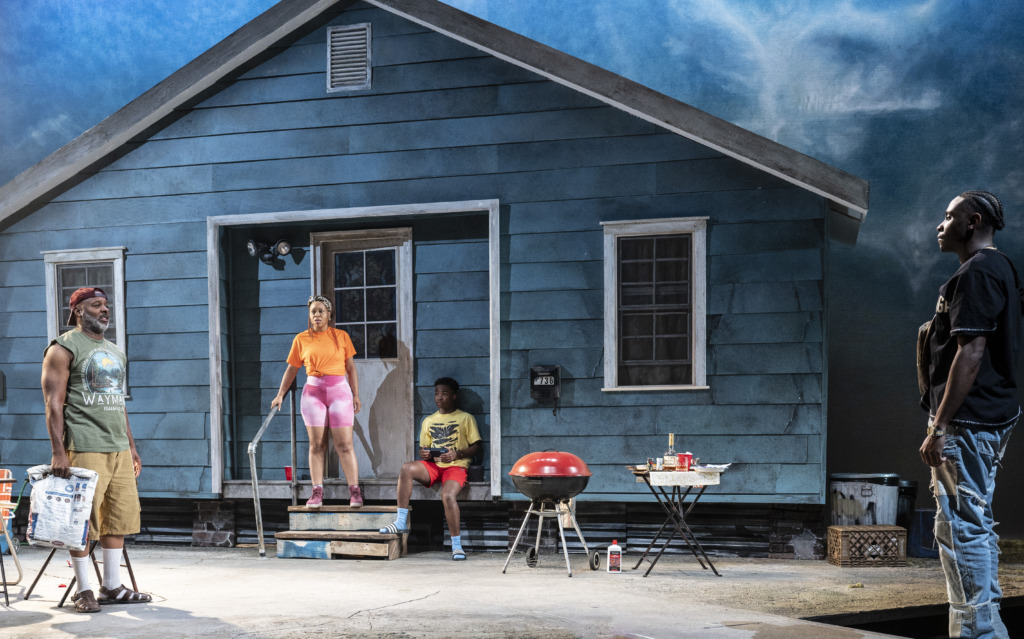
How one even finds the words to truly express how evocative, moving, gripping, passionate, and compelling this story is, well, that’s anyone’s guess. It’s a spiritual session of soul healing that speaks to every person on a different level. Filled with humor, intensely witty and caustic dialogue, explosive emotional turmoil, and a heartfelt sense of experiencing love, finding joy, and embracing your choice of happiness; this is a soul-soothing, heart-healing, life-changing piece of theatre will touch the very core of humanity’s existence in it’s two-hours’ stage traffic.
Jordan E. Cooper’s play is more than just evocative; it’s expressive, carefully and cleverly crafted, and done with such sharpened edges of nuance and zeniths of comedic balance against ugly-cry-pathos that you’ll leave with your head spinning but your heart bursting. Putting a new spin on the biblical anecdote of Noah & The Ark, Cooper’s work, steeped in divine spiritual realism, is an exquisite exploration of some of life’s toughest questions. A family, a black-sheep of said family, turmoil, chaos, tragedy and darkness, are all wrapped-up in Cooper’s extraordinary work. Was it mentioned that God also makes an appearance? Well, several appearances? And has a trio of back-up singers referred to as The Divines? (Don’t tell them that they’re back-up singers though, that might incur some almighty wrath from Glory, Mighty, and Holy…and yes, those are their names.) The poignancy and relevancy of this play is nothing short of breathtaking— a much needed sermon for those of all faiths when it comes to love and acceptance, especially self-love and self-acceptance.
Cooper’s dialogue exchanges— particularly when the protagonist Keyshawn (played by Cooper himself) has these go-round, verbal-spars with God (however the almighty is appearing in that moment)— are exhilarating. There are razor-sharp edged exchanges of wit, volley-lobs of emotional grenades, and soul-searing moments of tension woven meticulously into every moment of the play. And it’s also bursting at the narrative scenes with humor, heart, and a healthy dose of reality. The script is packed with quotable moments that are truly lessons to love with, live by, and to learn from; Cooper’s words become a gospel in their own right and when they’re married with moments of visceral dramatic tension or uproarious comedic outbursts, it’s a life-affirming, revelation of a theatrical experience that will shake you through to the core.
One could wax emphatically all day about the brilliance of Cooper’s work (and right now, this is just covering his work as the playwright, the beauty and intensity of his performance work in the role of Keyshawn hasn’t even been unearthed yet) but thousands of synonyms and well-parsed phrases are never truly going to do it justice. Especially when there are a good dozen other praiseworthy components to this world-premiere production, like the original music composed by Donald Lawrence. With a gospel flavor, Lawrence’s original songs add that elevated layer of bliss to the production, particularly the final number, “I See God In You” (which may or may not be the actual title of that song) as sung by The Divines (Courtney Monet as Holy Divine, Tiya Askia as Mighty Divine, and Latrice Pace as Glory Divine)— it’s an emotional reckoning come home and a phenomenal way to conclude the production. Taylor J. William’s, the production’s sound designer, works in tandem with Lawrence’s glorious song work to enhance the aural experience of the show. Every so often you can hear the glistening tinkle of windchimes— not wholly of this earth but still recognizable, just like the dove and olive branch in its visual representation of pace— smattered in the background at poignant moments of pause and contemplation. Williams’ also effectively crafts storm sounds that stir up a plethora of pathos in both the characters on stage (who can hear it) and members of the audience.
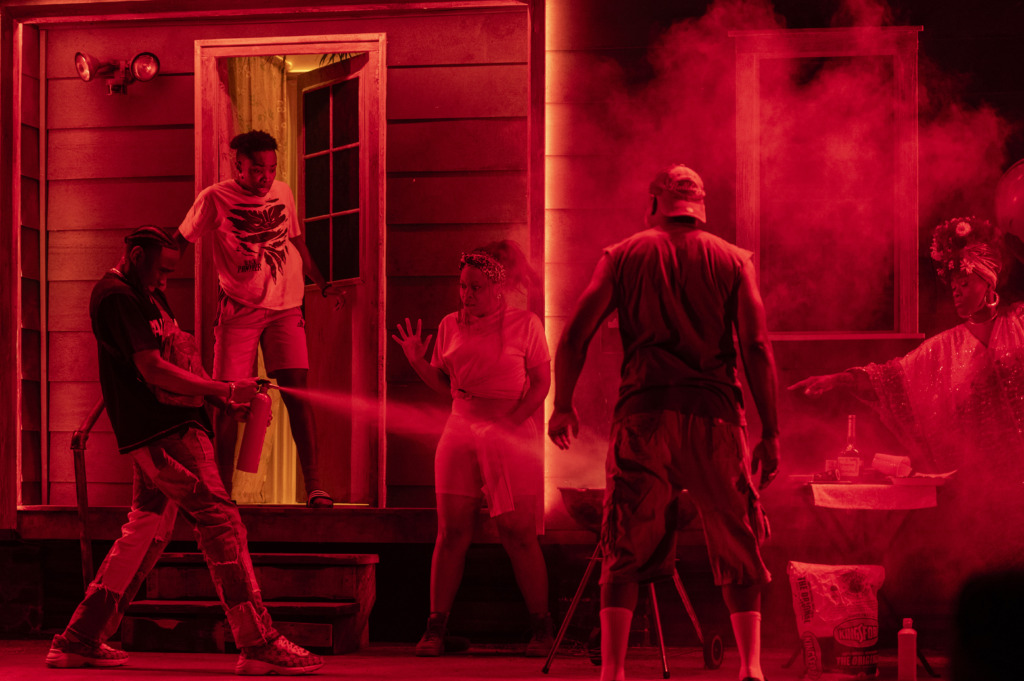
Sound and Lighting go hand in hand, just like faith, hope, and love in the grander scheme of things, so its no wonder that Adam Honoré’s lighting design is so well fitted to Williams’ sound design work. There is a stunning effect when it comes time for rain to finally let loose and in addition to the shadow-play that Honoré works into that moment, there’s a plentiful plethora of colorful cues that are used across the backdrop and in the show’s active foreground to shift spatial and temporal reality as well as alert the audience to the divine intervention of God. And The Divines.
Scenic Designer Luciana Stecconi may not give us a boat, but she certainly gives us a house. The attention to detail in the overall set is impressive. The cracked cement and dry brush around the edge of the yard to reinforce the rainless state of the show’s location in addition to the weary and distressed look of the house’s siding-panels set the tone from the moment the gauze-curtain is raised and you see it properly. There is a truly breathtaking scenic piece of artistry that shocks the audience at the end of the production; possibly the most impressive scenic trick seen at Baltimore’s Center Stage since their production of The Secret Garden in November of 2015. Complimenting Stecconi’s scenic choices, Costume Designer Celeste Jennings strikes a balance between the earthly and the holy, the human and the divine. The Divines themselves appear to be fabricated out of rain-cloud, twinkling-star-stuff, and splashes of purple, white, sliver, and blue. Jennings’ work for these three stellar female performers gives each of their namesakes— Glory, Mighty, and Holy— a vibrancy in their costumes. And it’s Jennings’ careful and clever use of sparkling rhinestones which helps to delineate when God has appeared on the stage in whichever form the almighty it taking in that moment. This very smart, albeit intricate and almost subtle detail, reaffirms one of the bigger messages in the play that God is always with you, even when you fail to notice, God is in everyone.
As the company’s artistic director, Stevie Walker-Webb has already set the bar of expectations tremendously high for those attending productions at Baltimore Center Stage. And his delivery of this world premiere is no exception, if anything, his direction far surpasses expectations, soaring into the realms of astonishing brilliance, theatrical genius, and then some. The play itself is a sensational gem, Walker-Webb’s guidance makes it a wondrous miracle. The moments of dramatic tension that get escalated in this play, juxtaposed up against some of those gut-busting moments of laughter, thrown up against some more sobering moments of silence or heated moments of argument are a testament to Walker-Webb’s capabilities as a director, his understanding of Jordan E. Cooper’s work, and his overall passionate dedication to exceptional theatre.
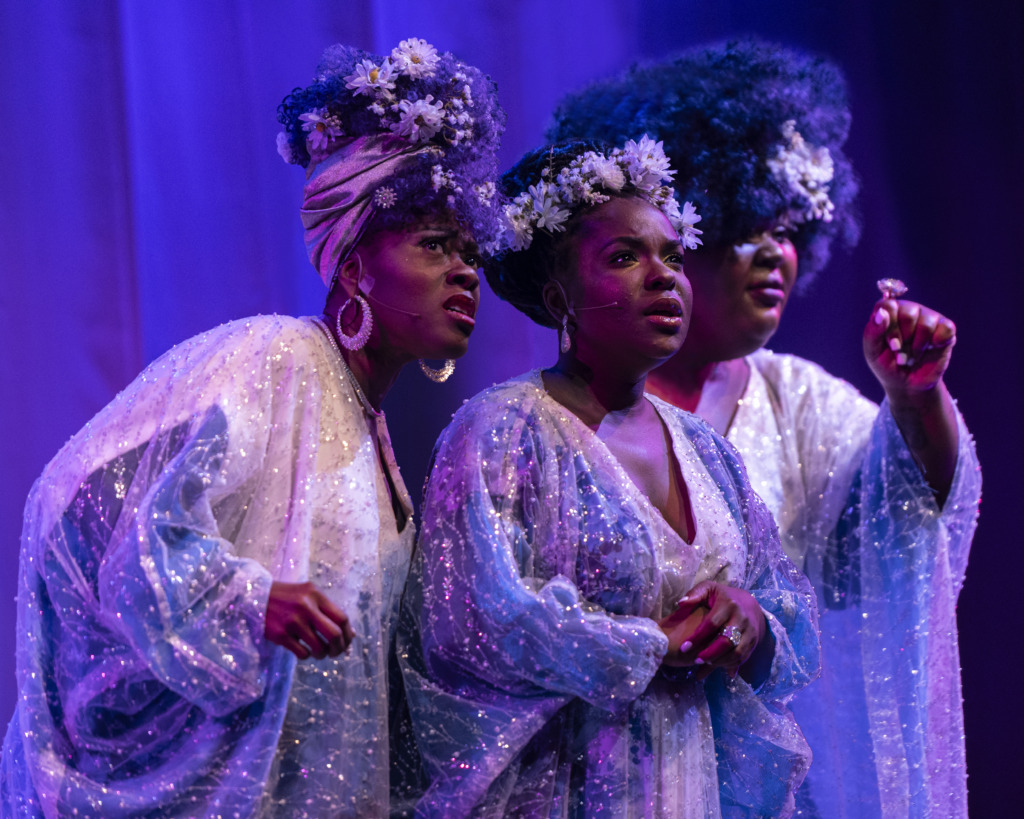
We’re still going to stand by not telling Holy Divine (Courtney Monet), Glory Divine (Latrice Pace), and Mighty Divine (Tiya Askia) that they’re God’s backup singers. But that said, when they sing— you can hear them from the stage of the Pearlstone straight up to the Head Theatre on the fourth floor. Gospel never sounded so good as when it’s being carried by Monet, Pace, and Askia in this production. Serving as narrative figures, fates, muses, comic relief, deus-ex-machina, Charon, angels— you name, these three powerhouse women fill out these roles flawlessly; everything from their singing to their sashaying to their simple appearances when the moments strike are stunning. Latrice Pace in particular, as Glory, seems to be the one whose character shoots her mouth off the most and that just adds to the humorous moments of their existence. All three of The Divines make this production perfection not only with their soul-bent singing but their mere presence on stage, whether its in moments of high-comedy or deep-heartfelt expression, like the final moments at the conclusion of the play.
Dissecting family drama is a common thread in theatre— from ancient Greece to present day— and Cooper’s work has that at its core amongst a great many other powerful topics, themes, and ideologies. You have Lewis (James T. Alfred) who is the father of Niecy (Tamika Lawrence) and Keyshawn (Jordan E. Cooper) and then the teenaged grandson Kevin (Justin Sturgis.) The interplay between these characters in their familial component is wild, and at times completely unhinged. As the younger character, Sturgis’ Kevin has that chucklesome interactive spirit that just plays well with everyone. Little one liners like trying not to talk about his mama’s cooking or announcing with caution that ‘company has arrived’ become thoroughly amusing in Sturgis’ capable hands. The duality of Sturgis, as well as Alfred in the role of Lewis and Lawrence in the role of Niecy when it comes time for them to portray another entity is remarkable, and cleanly delineated too.
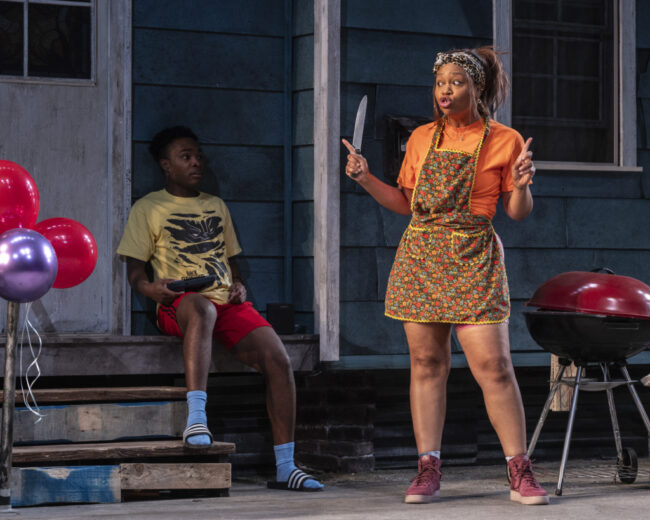
Alfred’s Lewis toes the fine line of becoming an angry, set-in-his-ways stereotype caricature but Alfred meticulously grounds his portrayal in deeply rooted, albeit unyielding experience-based-beliefs from his character’s past. While a great deal of the volcanic explosive arguments between Keyshawn’s character and the others comes from Lewis, there are moments of harrowing stillness in Alfred’s performance as well. And the moments of reckoning— like when his character delivers the line “A monster ain’t nothing but somebody trying to be bigger than the pain yelling inside them.”— are heart-stopping. You get a snappy comic edge on Lewis’ character earlier on in the performance as well, showcasing his versatility as a performer. Lewis is not afraid to showcase emotion when his character finally comes to the reconciliation of being able to do so.
Tamika Lawrence delivers a sassy and mouthy portrayal of Niecy, who much like the Kevin and Lewis characters in this play, has her humorous moments, her sobering moments, and her blast-your-ass-into-the-ground-with-shout-down-verbal-bombs moments. But there’s a whole section in the latter third of the first act where Lawrence is half-crouched in plié stance up on a crumpled tin garbage can and she dominates the stage, taking up every molecule of oxygen with her dialogue exchange during this sequence of dialogue exchanges with Keyshawn. The “clean up the spill” monologue she delivers has the tenacious equivalent of any sermon on the mount and is received with thunderous ovations from the audience when she finally draws it to its conclusion. Lawrence understands timing and delivery as well as nuance and balance when it comes to finding sincerity, humor, and more visceral expressions, regardless of who she’s interacting with or who she’s portraying in that moment.
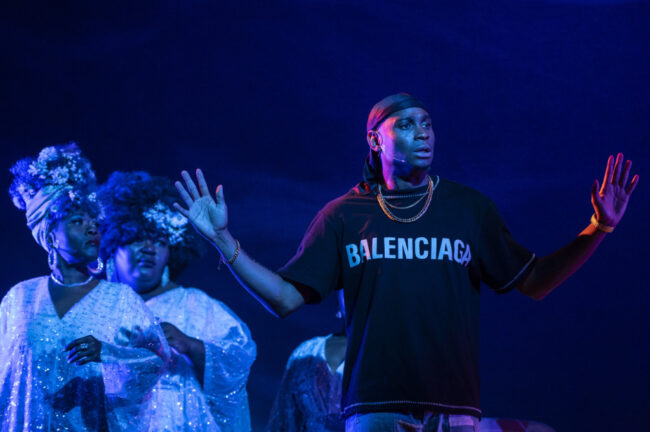
It’s rare that a playwright can be as gifted with words and narrative as Jordan E. Cooper is an be equally gifted in the field of performance. Playing the show’s protagonist could have been a double-edged sword for Cooper— who better to know the heartache, trials, and tribulations of that character than the one who wrote him, but all too often this is a trap because a playwright can be too married to the ideas that are written. Not at all the case for Cooper; he’s stellar on stage. As stellar as the work he’s written into the play; it’s theatrical bliss incarnate that he’s so sensational in both the role of lead protagonist and as the playwright of the work itself. His moments of devastating silence on stage as Keyshawn— when the character is attempting to bite through his tongue, keep those demons and emotions and explosions forced down inside of him, for the sake of God’s will— are a gutpunch— so visceral and expressive that you can feel your stomach churn, hoping that he succeeds with holding back. When he’s shouting out his soul, clapping back at Lewis or Niecy or God, it’s mesmerizing, you find yourself hanging on his every word and movement. And like the others, Cooper understands that balance of where and when and how to naturally unearth the humor without compromising the spiritual and emotional integrity of his character, of the narrative, or of the work as a whole. Not enough words in the world to get the description of how truly impressive that is to witness correct in print.
Choose your happy. Choose today to be the day that you be happy. And be happy by getting yourself a ticket to Oh Happy Day; it’s life-affirming, soul-searing, gut-wrenching, heart-filling, utterly freeing theatre that will change you.
Running Time: Approximately 2 hours with one intermission
Oh Happy Day! makes its world premiere at Baltimore Center Stage— now extended through October 20th 2024 in the Pearlstone Theatre of Baltimore Center Stage— 700 N. Calvert Street in the Mt. Vernon neighborhood of Baltimore, MD. For tickets call the box office at 410-332-0033 or purchase them online.

